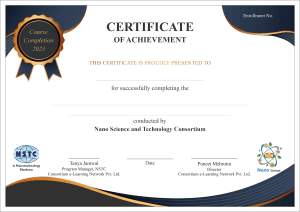
Industry Program In Nanotechnology
Nanotechnology, Industry, Program, Innovation, Nanomaterials, Nanoelectronics, Nanomedicine, Nanobiotechnology,
- Advanced Equipment Operation: Hands-on training with state-of-the-art equipment used in nanotechnology research and development, providing participants with real-world skills applicable to industrial settings.
- Experimental Techniques: Guided experimentation sessions to reinforce understanding of nanomaterial synthesis, characterization, and manipulation techniques, fostering proficiency in key methodologies used in nanotechnology.
- Case Studies and Protocols: Analysis of industry-relevant case studies and best practice protocols, enabling participants to gain insights into real-world applications and industry standards in nanotechnology.
- Collaborative Projects: Team-based projects designed to simulate industry scenarios, encouraging collaboration, problem-solving, and innovation among participants while addressing practical challenges in nanotechnology.
- Expert Guidance: Access to expert mentors and facilitators who provide personalized guidance, feedback, and support throughout the workshop, ensuring participants maximize their learning outcomes.
- Safety Training: Comprehensive safety training covering best practices and protocols for handling nanomaterials and working in nanotechnology laboratories, prioritizing participant well-being and adherence to safety standards.
- Networking Opportunities: Networking sessions with industry professionals, researchers, and peers, fostering connections and collaboration opportunities within the nanotechnology community.
Aim: The innovative Industry Program in Nanotechnology aims to give participants a thorough grounding in the skills necessary for a technology-based career in nanotech-based industries.
Program Objectives:
- Comprehensive Understanding: To provide participants with a thorough understanding of the principles, theories, and applications of nanotechnology across various industries.
- Technical Proficiency: To equip participants with the practical skills and knowledge necessary to work with nanomaterials, nanodevices, and nanosystems in a laboratory and industrial setting.
- Problem-Solving Skills: To enhance participants’ ability to identify, analyze, and solve complex problems encountered in nanotechnology research and development.
- Interdisciplinary Collaboration: To foster collaboration and communication skills necessary for working effectively in multidisciplinary teams comprised of scientists, engineers, and industry professionals.
- Safety Awareness: To promote awareness of safety protocols and best practices for handling nanomaterials and working in nanotechnology laboratories.
- Innovation and Creativity: To encourage innovative thinking and creativity in the design and development of new nanotechnology-based solutions for real-world applications.
- Industry Relevance: To ensure that the course content remains up-to-date and relevant to current trends, challenges, and opportunities in the nanotechnology industry.
What you will learn?
- Module 1: Profit from Nanotechnology- Applications of Nanotechnology in Various Sectors
- Module 2: Nano Materials -Concepts & Fundamentals
- Module 3: Nano Structures – Concepts & Fundamentals
- Module 4: Carbon Nanotubes- Technology & Applications
-
Module 5: Nano – Synthesis & Fabrication- Concepts & Fundamentals
-
Module 6: Nano -Characterization & Manipulation Concepts & Fundamentals
Get an e-Certificate of Participation!

Intended For :
Graduates, Post Graduates, Research Scholars, Academicians, Industry Professionals of nanotechnology, materials science, electronics, healthcare, energy, and environmental science
Career Supporting Skills

